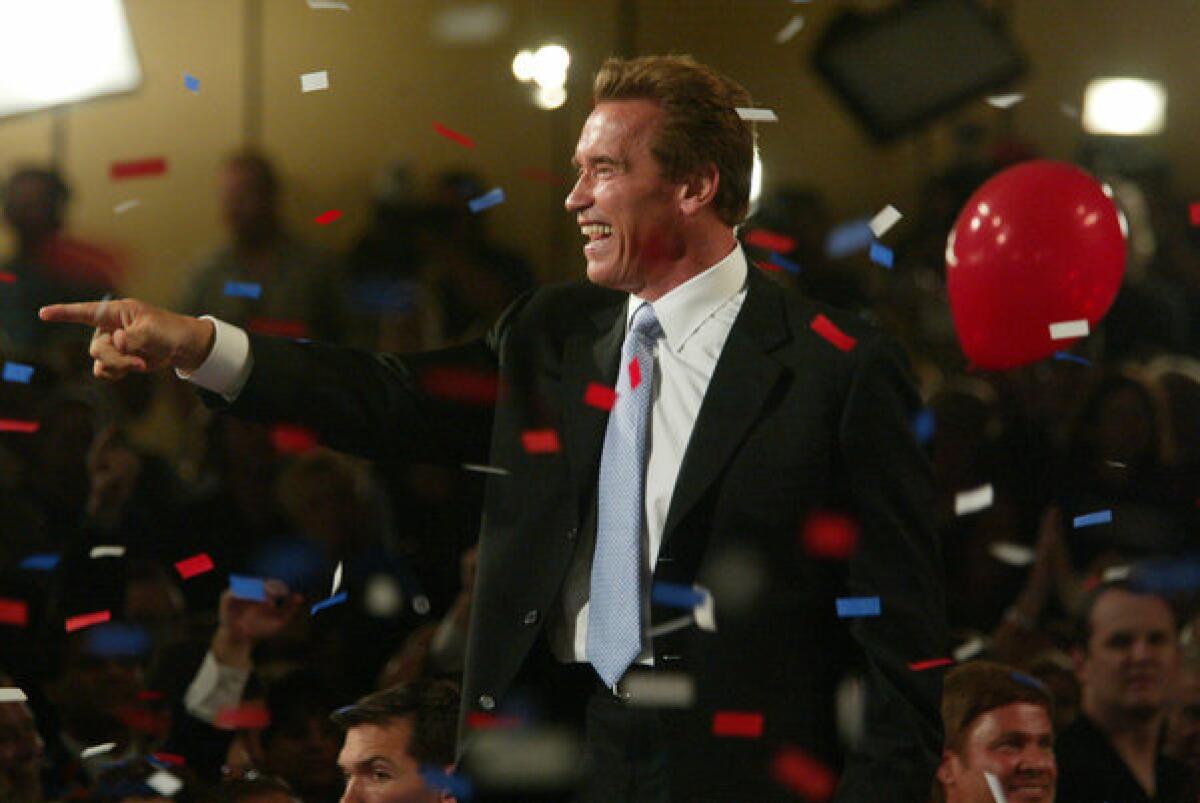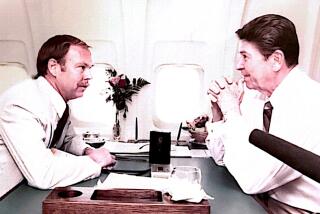Opportunity Lost: How Schwarzenegger failed to rescue California GOP

Arnold Schwarzenegger has a story he has often told about the lightning-strike moment he became a Republican.
He had just arrived in the United States in the roiling year 1968, with the closely fought Richard Nixon-Hubert Humphrey presidential race in full swing. He remembers watching television as a friend translated, from English to German, the back-and-forth between the two candidates. Nixon spoke of “free enterprise, getting the government off your back, lowering the taxes and strengthening the military,” Schwarzenegger recounted to cheers at the 2004 Republican National Convention. “I said to my friend, ‘What party is he?’ ”
“My friend said, ‘He’s a Republican.’ ”
“I said, ‘Then I am a Republican.’ ”
When Schwarzenegger entered the 2003 California gubernatorial recall race, with a surprise announcement on Jay Leno’s “Tonight Show,” it was a similar bolt from the blue. The California GOP was already well on its way to marginalization, thanks to positions on immigration, abortion and other issues that pushed the party increasingly to the right of most Californians.
But the fiscally conservative, socially liberal Schwarzenegger offered hope: to broaden the appeal of California Republicans, move the state party away from the ideological fringe and even, thanks to his celebrity and uber-personality, make the GOP seem a little less old and stodgy.
“Bringing in an immigrant movie actor was not Reaganesque, but it certainly was a bold stroke and it sure looked good on paper,” said Shawn Steel, a former state party chairman and early booster of the recall and, later, Schwarzenegger’s candidacy.
But like many hopes attached to the unprecedented election -- including an end to runaway spending, partisan acrimony and the consuming power of special interests in Sacramento -- the resurrection of the California Republican Party was not to be.
Looking back this week on the 10th anniversary of the recall, that should not be surprising. Although party leaders and the GOP establishment embraced Schwarzenegger -- actually, seized upon his candidacy like a drowning man hugging a life preserver -- the feeling was never mutual.
The actor assembled his own team of strategists, separate from the state party’s, to wage his gubernatorial campaign and then plot his political moves once he took office. His ideological swerves -- zigzagging from moderation to the far right and back to the left -- ended up alienating Democrats and Republicans alike.
And he made clear that the drudgery of party-building -- the rubber-chicken dinners, the grip-and-grin photographs with county chairmen, the sweet-talking recruitment of prospective candidates -- were not at all for him. To the contrary, Schwarzenegger was openly disdainful of his role as party leader.
“I’m not elected to represent the Republicans,” he said in an interview published by Washington Monthly magazine. “When I look at my pad of things that I want to accomplish every day, or every week, or every month ... it does not have on there anywhere to get more Republicans registered.... It’s not something that I ever get up in the morning and say, ‘This is my mission.’”
Steel, who was state GOP chairman when the first stirrings of the recall movement began in early 2003, promoted on talk radio the ouster of Democratic Gov. Gray Davis. In his last official act as party chairman, he put the state GOP on record in favor of the special election, overcoming the doubts of many in the party, including then-White House strategist Karl Rove.
Once Schwarzenegger jumped into the contest in August, elbowing aside a handful of mere-mortal politicians, “the expectations … were supersonic,” Steel said. Now, though, “I cannot begin to tell you the overwhelming disappointment.”
The state GOP is in even worse shape than before the recall movement. Statewide voter registration has fallen from 35% to 29%. (Democratic ranks have held steady at 44%, while the number of voters stating no party preference has climbed from 15% to 21% of the California electorate.)
Democrats command a supermajority in the Legislature and the Republicans are scrambling to find even reasonably competitive candidates to challenge Gov. Jerry Brown and the rest of the all-Democratic slate of state officeholders in 2014.
“We learned body-building is not a team sport,” Steel said, referring to Schwarzenegger’s pre-acting, pre-political career. Gazing eight hours a day into a mirror may be ego-gratifying, Steel suggested, but it doesn’t do a lot to help others.
Maybe somewhere there’s a synchronized swimmer looking to break into California politics.
Twitter: @markzbarabak
More to Read
Start your day right
Sign up for Essential California for news, features and recommendations from the L.A. Times and beyond in your inbox six days a week.
You may occasionally receive promotional content from the Los Angeles Times.







